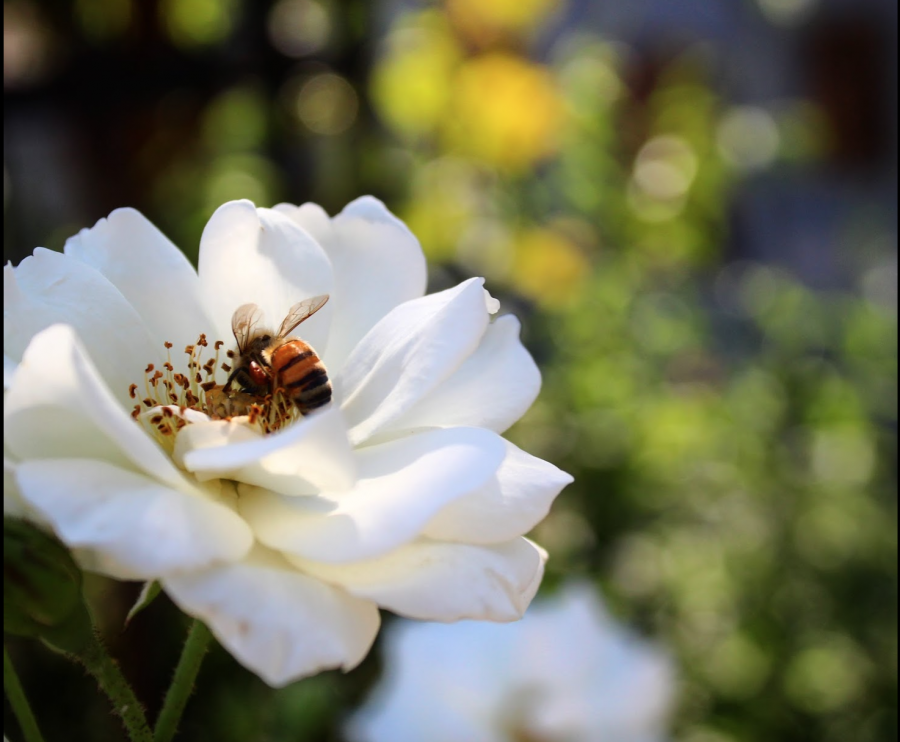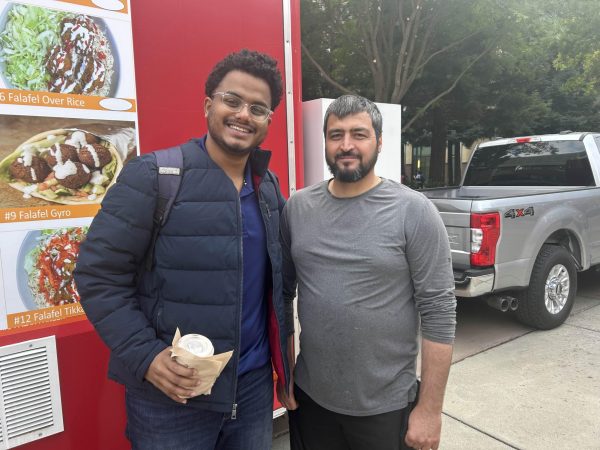Lessons in mindfulness commemorate 2020 lockdown
Close up of a bee on a white flower on the Chico State campus.
The smell of bees dancing in rosemary flowers, to the music of birdsongs, added ambience to the sunlight’s warm hugs as it pierced through the tree canopy. As I appreciate this moment, new, warm air fills my lungs after I exhale troubling thoughts of yester-year.
We’ve just passed the anniversary of the 2020 lockdown and it brings to the forefront of my mind past efforts to be emotionally centered amid chaos. Unexpected challenges confronted my meditation practice, which seems to have blossomed from last year’s strife-ridden haze.
2020’s lockdown interfered with many social gatherings that are usually conducive to my mental health, such as group meditation sessions. Since last year, I’ve heard stories of people adapting to the “new normal” by discovering new hobbies and completing new projects.
Meanwhile, other people like myself had to fight feelings of unfulfillment and worthlessness when comparing ourselves to others. Now that a year’s passed, I want all to know that if your only accomplishment was “hanging in there,” you deserve as much praise as someone who remodeled their house or raised a family.
I don’t think that the ability to take control of mental awareness is given the social credit it deserves in comparison to accomplishments measured in materials or finances.
I hope one day that all schools will offer mindfulness-based workshops or classes to all grade levels. If mindfulness and meditation were more widespread, how differently would we have managed the pandemic or our coping mechanisms?
Some people may understand meditation more easily through mindfulness-based practices. UC Berkeley’s Greater Good Magazine describes mindfulness as an act of acceptance without focusing on the dualism of “right” and “wrong.” Rooted in Buddhism, mindfulness gained popularity in the American medical community in the 1970s.
A 2019 report by the American Psychological Association found that mindfulness-based stress reduction was effective in reducing anxiety in undergraduate and graduate students. Evidence has confirmed the clinical use and therapeutic benefits of meditation.
In a 2017 study, a 20-minute mindfulness practice with basic yoga postures and breathwork throughout the academic semester appeared to help reduce stress and increase self-compassion.
Practicing daily gratitude was key for my mental health. Without group meditation, I rediscovered mindfulness through daily acts of gratitude.
Gratitude can be found in silence, anywhere and at any time. Such serenity is easily found on the property of Sky Creek Dharma Center, a meeting place for practitioners of mindfulness and meditation. Currently holding online sessions, the center hopes to reopen as Butte County moves into less restrictive tiers.
Before the pandemic, transferring to Butte College from out of state was a difficult move. As an introverted stranger to Chico, I uncomfortably searched for more community-oriented support. I ventured out in hopes of finding a community where I could learn new ideas and exchange insights with new people.
Sky Creek Dharma Center offered valuable support for my needs. Amos Clifford founded the center in 2004 as a communal space for several meditation groups, known collectively as “sangha.” Groups with different practices and tenets gather for the common goal of tranquility.
Meditation practitioner Bob Egert guides the Dharma Buffet group, along with other guides who alternate sessions on different days. Egert described the center as a congregation of different lineages and perspectives for the support of guided meditations.
I was only able to attend one session at the center in 2019 due to outside circumstances. Thankfully, that one session taught me valuable lessons for daily living. Following this, and a mindfulness workshop at Butte College, I grew more confident in my situation and shed my social awkwardness as I met fellow students who also meditated.
Questioning the aftermath of vaccinations, Egert hopes for changes and less dense gatherings. The advantage of meditation’s silent practice allows for smaller chances of viral transmission through droplets. Little to no talking occurs in group meditations. When it does occur, sangha groups practice and encourage mindful speaking, unlike the boisterous chatter of overlapped voices commonly heard in many public spaces.
Keep checking the center’s website for more details and potential updates. Session coordinators are prompt and friendly in their email responses. Although online sessions are different, the experience is still valuable for anyone who wants to learn something new.
“Meditation is always, really, a solo practice,” said Egert. Even when guided, the process is self-cultivated.
In honor of all that our physical and mental health has endured, we deserve to love ourselves and acknowledge our strengths. I look forward to making this past year’s lessons a model response to future adversity.
Shae Pastrana can be reached at [email protected] and @PastranaShae on Twitter.








